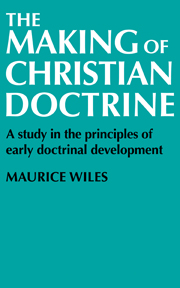Book contents
- Frontmatter
- Contents
- List of Abbreviations
- 1 The Development of Doctrine: The Nature of the Problem
- 2 Motives for Development in the Patristic Age
- 3 Scripture as a Source of Doctrine
- 4 Lex Orandi
- 5 Soteriology
- 6 The Form of the Arguments
- 7 The Assimilation of New Ideas
- 8 Towards a Doctrine of Development
- Index
8 - Towards a Doctrine of Development
Published online by Cambridge University Press: 16 October 2009
- Frontmatter
- Contents
- List of Abbreviations
- 1 The Development of Doctrine: The Nature of the Problem
- 2 Motives for Development in the Patristic Age
- 3 Scripture as a Source of Doctrine
- 4 Lex Orandi
- 5 Soteriology
- 6 The Form of the Arguments
- 7 The Assimilation of New Ideas
- 8 Towards a Doctrine of Development
- Index
Summary
The great doctrinal definitions of the early Church were the outcome of a closely contested process of reasoning. My aim in this study has been to give a critical review of some of the main aspects of that reasoning process. In particular we have considered three of the fundamental grounds of argumentation: the appeals to Scripture, to the experience of worship, and to the requirements of soteriology; and two important aspects of the way in which the reasoning was conducted: the tendency to objectification and the manner of incorporating new ideas into an existing body of agreed doctrine. In the course of this survey I have suggested a number of points at which the reasoning used seems to me to be open to serious criticism. Not everyone will agree with all the points that I have made, but equally few will, I imagine, be prepared to claim that the reasoning of the Fathers in these matters is wholly free from blemish. The final question we have to raise is what conclusions ought to be drawn from such a survey about the nature of the development of doctrine and about the attitude which it is reasonable to adopt towards the conclusions reached by the early Church.
- Type
- Chapter
- Information
- The Making of Christian DoctrineA Study in the Principles of Early Doctrinal Development, pp. 159 - 181Publisher: Cambridge University PressPrint publication year: 1967

